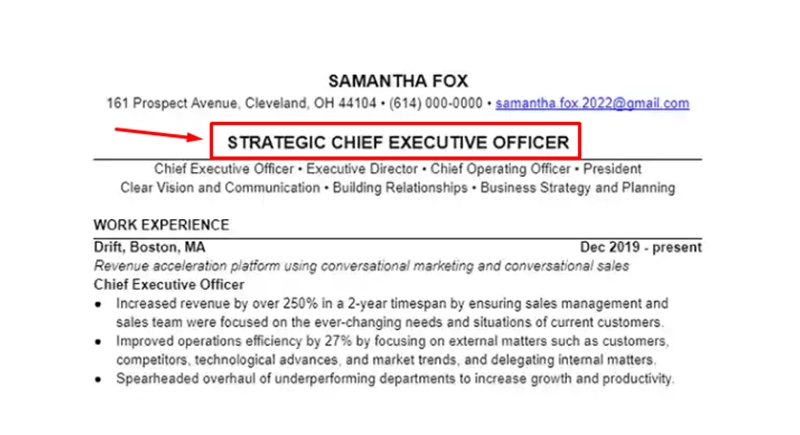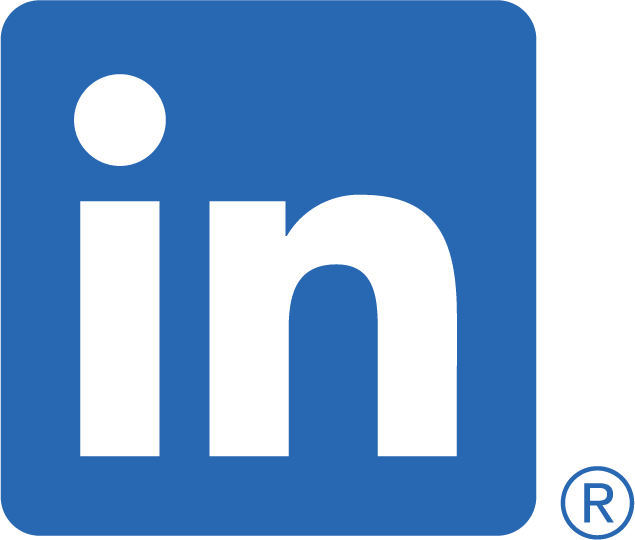Distinguishing your resume from a sea of competitors may seem like a challenge, but with a strong professional headline you can stand out. Phrases like “Innovative Operations Manager,” “Accomplished Financial Executive,” or “Leading Developer AR Algorithms” can catch the eye of a recruiter. And having the right professional title in your headline will tell an applicant tracking system (ATS) that you’re relevant for the job.
Crafting the perfect professional headline requires more effort than it may seem. In this article, we’ll dive further into the professional headline, discuss how to write the best one for your resume, and look at some examples.
Let’s get started.
What is a professional headline?

Your professional headline is a short statement that begins your four-line professional summary, which describes your current professional standing and replaces the old resume stalwart, the objective.
However, your professional headline should describe your next job title, or the title you’re aspiring to achieve.
Include a slightly flattering adjective before the job title. This adjective helps the recruiter or hiring manager understand what they can expect if you’re hired.
The details of your work experience section should reflect this, so the recruiter can confirm that what you claim in your headline is relevant and appropriate.
For example, if you use “strategic” in your headline, your work experience should mention the strategies you’ve used, deployed, and overseen, and quantify what the results of those strategies and efforts were.
Here are some ways a professional headline helps you present yourself to your four audiences (screeners, recruiters, your next boss, and the ATS):
- Highlight your strength: Your headline allows you to immediately put forth your number-one strength. If you’re detail-oriented, adding that in your headline will tell the recruiter. However, you will need to show that you are detail-oriented in your work experience section to make this claim credible.
- Set yourself apart: Use your headline as an opportunity to catch the recruiter’s attention. Tell them who you are professionally and why you’re a valuable candidate.
- Show where you are in your career: Your headline shows the recruiter which stage you have reached professionally. However, keep in mind that the headline should always include your next job title.
- Summarize your resume: Using a flattering adjective focuses the angle of your resume and helps shift the recruiter’s perspective.
- Help instruct the ATS: Since the ATS screens for keywords related to the job you applied for, having your future job title and an adjective that describes you in your headline helps your resume make it to the right recipient.
Lastly, keep in mind that your resume headline will need to be tailored according to the job you’re applying to.
How to write your professional headline
Here are a few tips that will help you write the best professional headline for your resume.
1. Include an accurate but flattering adjective
Adding an adjective that promotes your strengths elevates your headline, and it tells your four audiences more than it would if you simply stated your next job title.
It acts as a strong starter that immediately tells the recruiter what to expect from your resume.
Not only does it help set the recruiter’s expectations, but it also helps tie your resume together.
For example, if you’re applying for a software engineer job, you need a technical resume. All resumes should include numbers and quantifiable proof to showcase your skills and experience, but software engineers have to show that they are especially detail-oriented. Therefore, you can use detail-oriented as your accurate but flattering adjective.
After that, your technical resume would provide instances of where your attention to detail came in handy. For example, you may have caught an error in the software code that saved a certain number of dollars or days.
Adding something like this will strengthen the recruiter’s first impression of you.
Choose a flattering adjective that reflects your work experience, achievements, and what you do. Then provide proof of this particular attribute in action.
2. Customize the headline for different jobs
Just as you should customize each resume you submit for the individual job you’re applying for, it’s important to customize your headline based on what will most benefit that role and what you think the company is looking for.
This includes changing the accurate but flattering adjective you use and the job title. Companies can have differing job titles for the same role, so make sure you use the title that the company you want to work for uses.
Secondly, the adjective you use may need to change depending on what the company is asking for. For example, some companies expect marketing professionals to be strategy-oriented while others want them to be creative.
As a marketing professional, there’s a good chance you’ve utilized both strategy and creativity during your career. Depending on the adjective you use in your headline, you should have specific instances where you’ve used them that you can add to your work experience section.
Study the company and their job post to get a better idea of what kind of marketing professional they’re looking for. Then, adjust your adjective and your work experience section accordingly.
Customization of your resumes is important from the start to end, throughout your skills section, education section, and other relevant sections that you have.
Here are a few things to keep in mind when customizing your resume:
- Your contact information can stay the same on every resume, unless the job posting asks for specific information.
- Don’t include jobs or work experience that are more than 15 years old.
- Don’t use long paragraphs. Instead use short and concise sentences to keep the recruiter’s attention.
- If you’re less than a decade into your career, use a one-page resume. If you’ve been working for more than 10 years, you can opt for a two-page resume.
- Always use bullet points in your work experience section (10-15 if you’re using a one-page resume, and up to 25 if your resume is two pages).
Even if you’ve applied for the same job before, take a second look at the job post to check if anything’s changed.
3. Keep it short
Your professional headline, like the rest of your resume, should be concise and to the point. Limit the headline to three or four words, depending on how many words you need for the job title.
Keep your flattering adjective between 1-2 words. If you have a long job title, you can use easily understood abbreviations if needed.
However, in high-level roles using an abbreviation may undermine your position. For example, it’s better to use “Human Resources Director” instead of “HR Director.” The same goes for C-level positions.
Regardless, brevity is key with your resume headline. You want the recruiter to get an idea of who you are after one look at your resume.
Conciseness is crucial throughout your resume because recruiters have many to go through. Being concise and using a traditional, “boring” format helps them get through your resume and take away the most important points. Using fancy formatting and overstuffing your resume with everything you’ve ever done will hurt your odds of being invited for an interview.
Recruiters want simple resumes because they have a system for reading a standardized format. If you do something untraditional, like use sidebars, infographics, and other images, they’ll have to put extra effort into going through your resume. Plus you want to make the ATS’s job as easy as possible, and they can’t read graphics or other images. You don’t want the recruiter or the ATS to miss key details of your resume.
The more skimmable you can make it, the better. It will help you make an impact quickly, stand out, and show your audiences that you’re a strong candidate for the job.
4. Avoid generic adjectives
Don’t wear out your thesaurus, but use an attention-grabbing adjective in your professional headline. Generic adjectives like “successful” tell the recruiter little about who you are as a candidate, and they’re a wasted opportunity to stand out.
Generic adjectives are no different than filler words. They add nothing to your headline and end up doing more damage than good.
Keep in mind that the recruiter goes through tons of resumes and there’s a good chance that they see such generic adjectives and phrases a lot. Using a strong adjective here is a good way to stand out.
Your professional headline tells your story in just 3-5 words. It’s the foundation of the rest of your resume, as everything else you include should complement your headline.
When you’re writing the bullet points in your work experience section, these points should support your headline by showing that your achievements had quantifiable results for the company you worked for.
Generic duties that are common to any given role is of little importance to the recruiter. They want to know how you succeeded in that role, what you achieved, and what your potential is for your next employer.
That’s how they can determine whether you’re right for the role or not.
The same is true for your skills section. Telling the recruiter about generic skills is a waste of space because you can show that you have those skills by tailoring your work experience section. Instead, use the skills section to mention technical skills that make you stand out and any other important but relevant skills that you have.
Professional headline examples
Here are some examples for inspiration when writing your professional headline. We’ve included examples for various job titles and industries.
Accounting and finance
- Detail-Oriented Senior Accountant
- Strategic Financial Analyst
- Detail-Oriented Investment Banking Analyst
- Driven Equity Research Analyst
- Strategic Pricing Analyst
Accounting and finance roles deal with data and strategy, and require delicate attention to detail.
Executive and general management
- Strategic Chief Executive Officer
- Strategic FP&A Senior Director
- Experienced Supply Chain Manager
- Detail-Oriented Admin Assistant
- Growth-Focused General Manager
Keep in mind that for C-level and executive roles, it’s better to write the full title instead of using an abbreviation.
Human resources
- Talented Human Resources Manager
- Trusted HR Assistant
- Experienced HR Coordinator
- Results-Driven Event Manager
- Strategic PR Manager
For HR roles, manager-level roles and above write “human resources” instead of the HR abbreviation. However, for entry-level and pre-manager HR roles, it’s better to use the abbreviation.
Marketing and design
- Creative Marketing Manager
- Strategic Marketing Analyst
- Data-Driven Marketing Coordinator
- Strategic Creative Director
- Technical Graphic Designer
Marketing and design resume headlines differ based on what the role asks for. For example, if the job you’re applying to is strategy-based, it’s better to use “strategic.” However, if it requires creativity and ideation, it’s better to start your headline with “creative.”
Sales and business development
- Top-Performing Sales Executive
- Data-Driven Business Analyst
- Strategic Insurance Consultant
- Detail-Oriented Data Analyst
- Focused Sales Coordinator
Sales and business development roles are often data and performance-based. That’s why you need to start your headline with an adjective the recruiter will want to see.
For example, for a sales executive, stellar sales performance is the most important factor. This is why an adjective like “top-performing” to start your headline reflects well on your resume.
After that, you can add details about a job where you were the top-performing sales executive with quantifiable proof.
Write a great professional headline today
Your professional headline is one of the first things a recruiter or hiring manager will see when they look at your resume. And since the average resume gets 7.4 seconds to impress a recruiter, you want to stand out immediately.
Data shows that 40% of employees consider leaving their jobs within 3-6 months, so outshine other candidates by showing the recruiter and hiring manager that you’re worth investing in.
Craft each part of your resume so it tells a single story about why you’re the right person for the job.
If you’re having a difficult time bringing it all together, you can always enlist the help of resume professionals.
...







